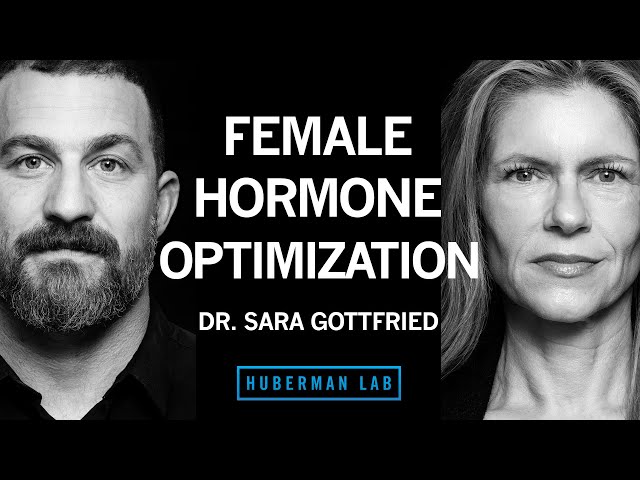How to Optimize Female Hormone Health for Vitality & Longevity

Unlocking the secrets to a long and vibrant life involves various strategies. These strategies include health evaluations, blood work, hormone and drug therapies, supplementation, nutrition, and exercise. By conducting health evaluations, individuals can gain insight into their overall well-being and identify any potential health concerns.
Blood work plays a crucial role in assessing various markers that can impact longevity. In addition to commonly discussed markers, such as cholesterol levels and blood pressure, it is important to consider lesser-discussed markers that may provide valuable information about an individual’s health. Emerging research is shedding light on new markers that may be relevant to a longer and healthier lifespan.
Hormone and drug therapies can also play a role in maintaining optimal health as individuals age. Supplementation and proper nutrition are vital for providing the body with essential nutrients that support overall well-being. Finally, regular exercise is crucial for maintaining physical fitness and promoting longevity. By incorporating these various strategies into one’s lifestyle, individuals can unlock the secrets to a long and vibrant life.
Key Takeaways
- Evaluating one’s health status through regular blood work is crucial for understanding and optimizing lifespan and health span.
- Key factors to look for in blood work include markers that influence lifespan and health span, such as cholesterol levels, inflammation markers, and hormone levels.
- Considering lesser-discussed markers in blood work can provide valuable insights into overall health and potential areas for improvement.
- Hormone health plays a significant role in vitality and longevity, and hormone therapies can be beneficial for both men and women, but careful consideration and informed decision-making are important.
Evaluating Health Status and Blood Work
Evaluating one’s health status through regular blood work is a vital component in understanding and optimizing lifespan and health span. The frequency of blood work plays a crucial role in detecting and addressing potential health issues early on. Routine blood tests allow healthcare professionals to assess various markers that indicate overall health, including cholesterol levels, blood sugar levels, and liver function.
Additionally, blood work can provide valuable insights into hormone health, which is significant for maintaining optimal vitality and longevity. Hormones play a pivotal role in regulating various bodily functions, such as metabolism, mood, and reproductive health. By monitoring hormone levels through blood work, individuals can identify any imbalances or deficiencies and take appropriate measures to restore hormonal equilibrium.
Therefore, regular blood work, including assessments of hormone health, is essential for individuals seeking to serve others by optimizing their own health and lifespan.
Hormone Health and Therapies
Regular blood work, including assessments of hormone health, is crucial for individuals seeking to optimize their own health and lifespan. Transitioning into the subtopic of ‘Hormone Health and Therapies’, exploring the role hormones play in maintaining vitality and longevity.
Hormone therapies can be beneficial in addressing hormonal imbalances and promoting overall well-being. Some different types of hormone therapies include:
- Hormone replacement therapy (HRT): This therapy involves replacing hormones that are no longer produced in sufficient amounts by the body.
- Bioidentical hormone therapy: Bioidentical hormones are synthesized to be identical in structure to hormones naturally produced by the body.
- Growth hormone therapy: This therapy involves the use of synthetic growth hormone to address deficiencies and promote healthy aging.
- Thyroid hormone therapy: This therapy aims to regulate thyroid hormone levels in individuals with hypothyroidism or other thyroid disorders.
When considering hormone therapies, it is important to weigh the benefits against potential risks and side effects. Consulting with a healthcare professional knowledgeable in hormone health is essential to make informed decisions about hormone therapies.
Drug Therapies for Mind and Body
Drug therapies play a significant role in optimizing mental and physical health, providing individuals with effective interventions to enhance vitality and extend lifespan.
When it comes to mental health, drug therapies such as antidepressants, antianxiety medications, and mood stabilizers can help manage symptoms and improve overall well-being. These medications work by targeting specific neurotransmitters in the brain, helping to regulate mood, reduce anxiety, and alleviate symptoms of mental disorders.
However, it is important to note that drug therapies for mental health come with potential risks. Some medications may have side effects, and there is also a risk of dependence or addiction with certain drugs. It is crucial for individuals to work closely with healthcare professionals to ensure the benefits outweigh the risks and to monitor their mental health while on medication.
Supplementation for Optimal Health
Supplementation plays a crucial role in optimizing health and lifespan by providing individuals with essential nutrients and compounds that support overall well-being.
When it comes to supplementation, there are several key factors to consider to ensure safety and effectiveness. These include:
- Quality assurance: Choosing supplements from reputable brands that adhere to high quality standards and undergo third-party testing.
- Personalized approach: Tailoring supplementation based on individual needs and deficiencies, as determined by blood work and health assessments.
- Evidence-based ingredients: Selecting supplements that are backed by scientific research and have demonstrated efficacy in optimizing nutrition.
- Proper dosing and timing: Following recommended dosage guidelines and taking supplements at appropriate times to maximize absorption and benefits.
Nutrition for Longevity
Proper nutrition plays a vital role in promoting longevity and overall well-being. Longevity and diet are closely intertwined, and adopting a nutritious diet can significantly impact lifespan.
Nutritional interventions for lifespan involve consuming a balanced and diverse diet that includes fruits, vegetables, whole grains, lean proteins, and healthy fats. These nutrient-rich foods provide essential vitamins, minerals, antioxidants, and phytochemicals that support cellular health and protect against chronic diseases.
Research has shown that certain dietary patterns, such as the Mediterranean diet and the Okinawan diet, are associated with increased lifespan and improved health outcomes. Additionally, calorie restriction and intermittent fasting have been studied as potential strategies to enhance longevity.
It is important to consult with a healthcare professional or registered dietitian to develop a personalized nutrition plan that aligns with individual needs and goals. By prioritizing nutrition and making informed dietary choices, individuals can optimize their health and promote longevity.
Exercise and Lifespan
The role of physical activity in promoting longevity and overall well-being is a crucial aspect to consider when discussing the subtopic of ‘Exercise and Lifespan’. Regular exercise has numerous benefits that can significantly impact lifespan and health span.
Here are some key points to consider:
- Exercise benefits:
- Reduces the risk of chronic diseases such as heart disease, diabetes, and certain types of cancer.
- Improves cardiovascular health, strength, and flexibility.
- Enhances mental well-being by reducing stress and anxiety.
- Helps maintain a healthy weight and body composition.
- Exercise guidelines:
- The World Health Organization recommends at least 150 minutes of moderate-intensity aerobic activity or 75 minutes of vigorous-intensity aerobic activity per week.
- Strength training exercises should be performed at least twice a week.
- It’s important to choose activities that you enjoy and can sustain in the long term.
Predictors of Lifespan and Health Span
Research on predictors of lifespan and health span has provided valuable insights into the factors that influence overall health and longevity. Emerging research on longevity predictors has identified several key factors that play a significant role in determining lifespan and health span. These predictors include genetics, lifestyle choices, environmental factors, and socio-economic status. Understanding and monitoring these predictors can help individuals make informed decisions to improve their own lifespan and health span.
| Predictors of Lifespan and Health Span |
|---|
| Genetics |
| Lifestyle choices |
| Environmental factors |
| Socio-economic status |
Practical applications for improving health and lifespan include adopting a healthy diet, engaging in regular physical activity, managing stress levels, getting enough sleep, and avoiding harmful habits such as smoking and excessive alcohol consumption. By addressing these predictors and making positive changes, individuals can enhance their chances of living a longer, healthier life.
Key Factors in Blood Work
Emerging research on predictors of lifespan and health span has highlighted the importance of evaluating key factors in blood work to gain valuable insights into one’s overall health and potential longevity. Regular blood work can provide vital information about various aspects of our health and help us understand the trajectory of our well-being.
Here are four key factors to consider in blood work:
- Complete blood count (CBC): Evaluating red and white blood cell counts, hemoglobin levels, and platelet counts can provide insights into the immune system, oxygen-carrying capacity, and overall blood health.
- Lipid profile: Measuring cholesterol levels, including LDL, HDL, and triglycerides, can assess cardiovascular health and the risk of developing heart disease.
- Blood glucose levels: Monitoring fasting blood glucose levels can help identify potential diabetes or insulin resistance.
- Inflammatory markers: Assessing markers such as C-reactive protein (CRP) and erythrocyte sedimentation rate (ESR) can indicate inflammation in the body, which is linked to various chronic diseases.
Understanding the relationship between blood work and health trajectory can guide individuals in making informed decisions regarding their lifestyle, nutrition, and medical interventions to optimize their health and extend their lifespan.
Lesser-Discussed Markers in Blood Work
When analyzing blood work, it is important to consider lesser-discussed markers that can provide valuable insights into an individual’s health and potential longevity. While traditional markers like cholesterol levels and blood pressure are commonly discussed, there are other markers that can be counterintuitive but offer important information about one’s health trajectory.
For example, markers such as C-reactive protein (CRP), homocysteine, and glycated hemoglobin (HbA1c) can indicate levels of inflammation, cardiovascular risk, and blood sugar control, respectively. High levels of these markers may indicate an increased risk for chronic diseases and a shorter lifespan.
Additionally, markers like vitamin D levels, omega-3 fatty acids, and telomere length can provide insights into overall health and cellular aging. Low levels of vitamin D and omega-3 fatty acids, as well as shorter telomeres, have been associated with a higher risk of age-related diseases and a shorter lifespan.
Impact of Hormone Therapies
As we continue exploring the markers in blood work that can provide valuable insights into an individual’s health and potential longevity, it is crucial to examine the impact of hormone therapies in optimizing overall vitality and extending lifespan. Hormone therapies have gained significant attention for their potential benefits in maintaining hormonal balance and promoting healthy aging.
Here are some key points to consider regarding the impact of hormone therapies:
- Impact of hormone therapies: Hormone therapies can help address hormonal imbalances, such as low testosterone or estrogen levels, which can have a significant impact on overall health and vitality.
- Benefits of hormone therapies: Hormone therapies have been shown to improve energy levels, enhance cognitive function, promote muscle strength, and support bone health.
- Considerations of hormone therapies: It is important to consult with a healthcare professional experienced in hormone therapy to determine the appropriate treatment options, dosage, and monitoring protocols.
- Individualized approach: Hormone therapies should be tailored to an individual’s specific needs, taking into account factors such as age, gender, medical history, and personal goals.
Role of Drug Therapies in Vitality
Drug therapies play a crucial role in optimizing vitality and extending lifespan by addressing specific health conditions and improving overall well-being.
However, it is important to consider the potential risks and long-term effects of drugs when making informed decisions about their use.
While drug therapies can effectively treat various health conditions, they may also have side effects that need to be carefully monitored and managed. Some drugs can cause adverse reactions or interact with other medications, highlighting the importance of personalized treatment plans and regular follow-ups with healthcare professionals.
Additionally, long-term use of certain drugs may have unknown effects on health and longevity, underscoring the need for ongoing research and monitoring.
Frequently Asked Questions
What Are Some Unconventional Markers to Consider in Blood Work That Can Provide Insight Into Overall Health and Lifespan?
Unconventional biomarkers in blood work can offer valuable insights into overall health and lifespan. Longevity research has identified markers like telomere length, mitochondrial function, and inflammation levels as potential indicators of longevity and vitality.
How Do Hormone Therapies Impact Not Only Physical Health but Also Mental Well-Being?
Hormone therapies have a significant impact on mental health and emotional well-being. They can alleviate symptoms of depression, anxiety, and mood disorders, improving overall quality of life and vitality.
Are There Any Specific Drugs That Have Been Shown to Have a Positive Effect on Both the Mind and Body?
Yes, there are specific drug options that have been shown to have a positive effect on both the mind and body. These drugs have been studied for their long-term effects and can be beneficial for overall health and vitality.
What Are Some Scientifically Supported Supplements That Can Help Optimize Health and Extend Lifespan?
Scientifically supported supplements, such as omega-3 fatty acids, vitamin D, and probiotics, have been shown to optimize health and extend lifespan. These natural remedies can provide essential nutrients and support various bodily functions, promoting overall vitality and longevity.
How Does Exercise Specifically Contribute to Extending Lifespan and Improving Overall Health Span?
Exercise benefits include extending lifespan and improving overall health span. Regular physical activity has been shown to reduce the risk of chronic diseases, improve cardiovascular health, enhance cognitive function, and promote mental well-being, contributing to a longer and healthier life.








